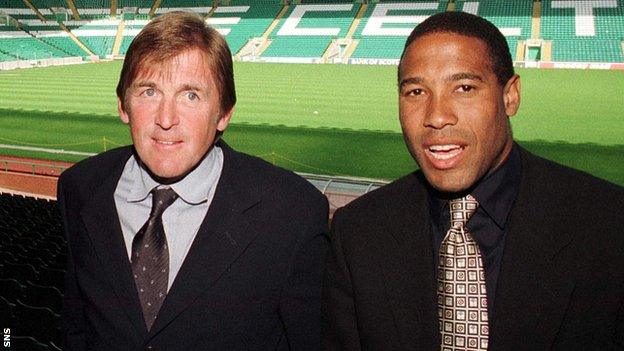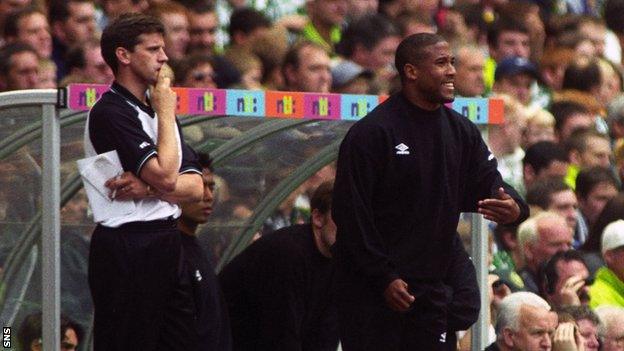John Barnes: 'Black managers given less time'
- Published

Kenny Dalglish and John Barnes arrived at Celtic Park in June 1999 as director of football and head coach respectively
Black football managers are given less time than white counterparts to turn poor form around, claims John Barnes.
The former Celtic, Jamaica and Tranmere boss told BBC Scotland he believes unconscious bias is commonplace.
The 56-year-old said: "Results get you sacked. For the vast majority of black managers, they will be sacked quicker than a failed white manager.
"There is no evidence. It's just a feeling that we get and the statistics will suggest that."
Barnes, born in Jamaica, starred for Watford, Liverpool and England in the 1980s and '90s. He was appointed head coach at Celtic in 1999, with fellow Liverpool favourite Kenny Dalglish installed at the same time as director of football.
However, Barnes' time at the Glasgow club was fraught and he was sacked following the 3-1 Scottish Cup defeat by second-tier Inverness Caledonian Thistle. His team had won 13 and drawn two of their 20 league games.
In the past week he has expressed his views on Twitter and responded to comments made by fans about the restricted opportunities for black managers and how quickly they may be sacked relative to their white counterparts.
"I was just engaging with people," he explained. "It went on to become personal, or all about Celtic and all about racism in football, but that was not what it was all about.
"How can you prove it? You can't. Even with statistics, it could still be coincidence.
"There's not one British black manager who has been at a club more than one or two years, which would suggest if it wasn't anything to do with bias whatsoever, all black managers are not good enough, because they're black."
'Celtic struggle nothing to do with my race'

Barnes was assisted by Eric Black in his time at Celtic
Barnes believes the issue is not so much one of prospective black managers being given the opportunity, but "the opportunity to be given time, trust, belief".
Of his time at Celtic, Barnes said his experiences "had nothing to do with my race".
"From the first week I lost the dressing room, but that had nothing to do with my colour," he said. "There were other dynamics being told about me, my capabilities.
"I was undermined straight away by the fans who said, 'Should John Barnes have been given the job?'
"The chief executive said, 'It's a risk we're taking but we've got Kenny Dalglish here,' which undermined me straight away.
"I know that the hierarchy didn't want me there, but Kenny Dalglish insisted and I thank Kenny for that to my dying day because I wanted to be a coach.
"You had a big split in the dressing room. You had players who were bigger than others. It was very obvious the disrespect they had for Bobby Petta and Stiliyan Petrov. I had them crying in my office.
"I knew it wouldn't last. I said to my wife after one week, 'Don't move up, because this is not going to work,' and that was when things were going well in the first six to eight games. I didn't get another job for nine years."
'Until we admit it, nothing will change'
Barnes believes football is no different from society in general and his view is that the first step to resolving the problem is to admit it exists.
"Where do you see black leaders in mainstream institutions?" he said. "The first thing is to own it. People will agree with you [on bias] but say it's 'not at our club'.
"People think that racists are people who throw bananas on the field and hurl abuse, and if we don't do it, we're not racist. There are degrees of discrimination amongst all of us, from a sexist point of view, a homophobic point of view and a race point of view.
"We are all biased to a certain degree. Until we admit it, nothing will change."